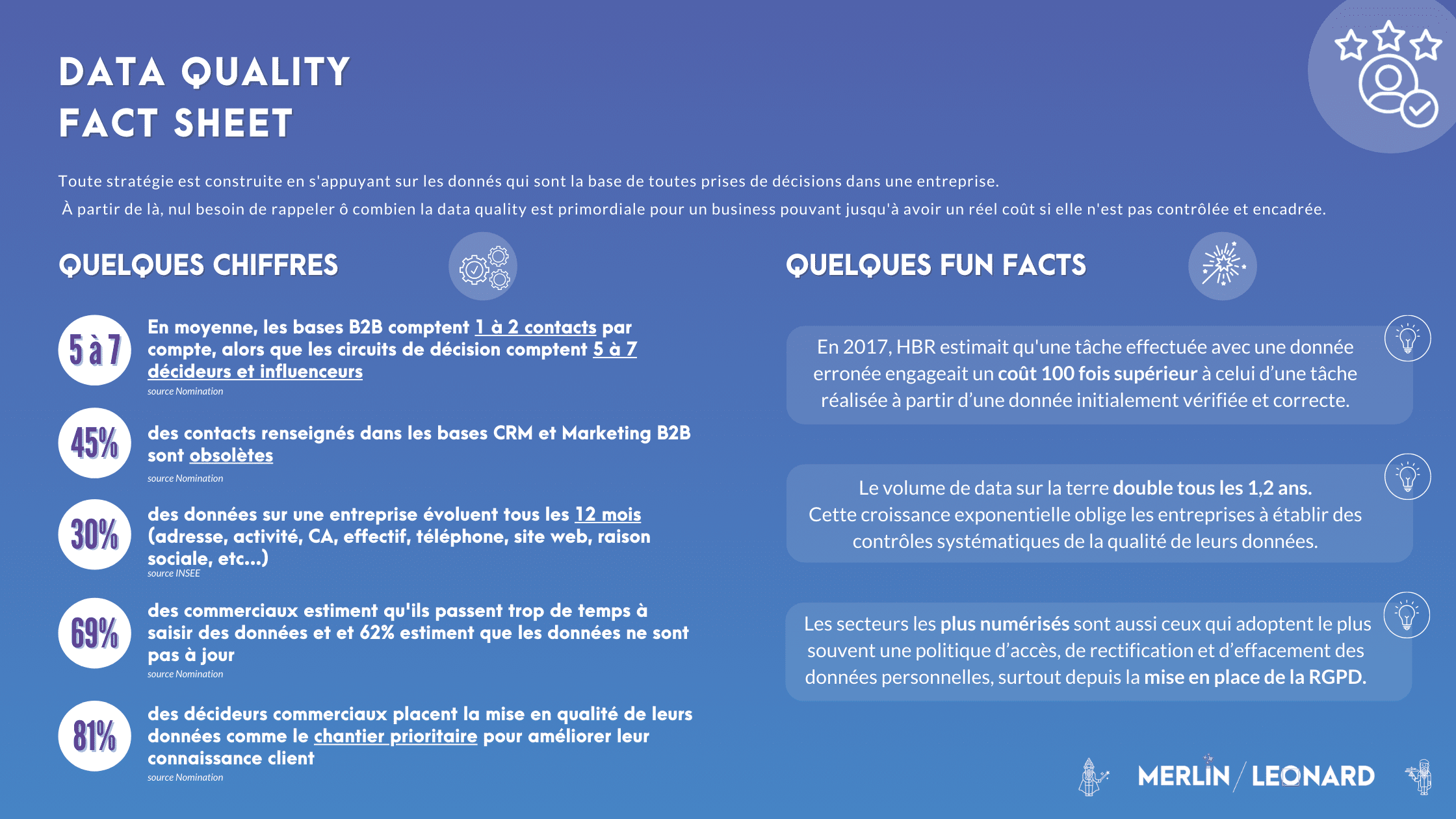If you read the specialized press, you must know that data is the new grail of business. However, the data collected from customers and prospects must be of good quality… How can you ensure a great customer experience if your databases are filled with bad data? This scourge can have serious financial consequences and fighting it has now become essential for companies. At M/L, Leonard and Merlin have implemented their best automation formulas to defeat bad data – aka evil – and improve data quality.
But nothing better than a few numbers to illustrate the problem:
25% of critical data in the largest companies is incorrect
45% of contacts in CRM and B2B marketing databases are obsolete
40% of resumes published on Linkedin are false or contain erroneous information
30% of a company’s data changes within 12 months.
Sources : Nomination
Find out why it’s important to improve data quality right now.
Sign up for the Data Quality program: 11 exclusive contents to understand the topic and know how to fight the hydra of poor data quality!
A short history of data quality
With the introduction of CRM in the 1990’s and 2000’s, we moved from customer accounts to customer contact. Then companies started to focus more and more on prospects.
And whether it was the CFO or the sales people, nobody wanted to correct data errors. This is when the first data quality problems appeared.
Data quality became a real problem when new marketing automation technologies appeared in 2010. These technologies have made it possible to automate inbound and outbound mailings, with public exposure of data that was previously internal: first name, last name, company name, etc. Thus, every registration error can have a direct impact on the customer experience. Today, improving data quality is a priority for marketing teams.
Thirty years ago, when systems were almost exclusively focused on accounts and contracts, there was no real focus on data quality. It was difficult to make mistakes, to have duplicate accounts, misspelled data, etc.
What is data quality?
Data quality is both :
- Measuring the relevance of the data collected in a contact database;
- Implementing actions to correct and optimize the data over time.
Improving the quality of the data collected then helps to avoid:
- Obsolescence: 20 to 30% of contacts become obsolete after one year;
- Potential errors generally linked to manual data entry;
- Duplicate records often due to inter-system connection or stacking problems;
- Quality problems related to the level of completion of contact records.
Here you will find your Data Quality checklist and the 5 important keys.
2 examples of risks associated with data quality
In the early 2000s, a major telephone company set up a CRM that collected data from various acquisition channels. But in this database, many contacts did not have a postal address. To compensate for this, the company decided to register its own address while waiting to update its file. But the day the marketing team decided to send all its customers a nice brochure by mail, things got tough. A week later, the operator found itself with a delivery of 4 tons of brochures directly to its headquarters!
Second risk: the fashion effect. In 1998, with the soccer world cup, the customer bases were filled with Zinédine Zidane in the contacts. With personalization, we quickly found ourselves with masses of “Hello Zinédine” or “Hello Mr. Zidane” in the emails. And of course, no contact really had that name.
Now you understand that data quality can have real consequences!
Who is responsible for improving data quality?
Poor data quality causes significant problems in the customer experience. Teams need to find solutions to optimize data quality. But it’s not up to the sales people to take care of the problem. Indeed, a sales person is expensive and his time is precious. They must therefore remain focused on completing the customer journey and signing contracts.
Today, the primary guarantors of data quality are the marketing teams who are at the root of the problem:
- Targeting prospects and customers;
- Contact segmentation;
- Setting up intelligent campaigns.
It is therefore up to the marketing teams to check data quality at the very beginning of the chain, as soon as they enter the funnel!
Do you want to improve data quality to preserve customer relationships? Merlin/Leonard can help you in your fight against evil.
I invite you to first understand the major Data Quality solutions.
To discuss your data quality project, book your free 30-minute meeting with our expert now.







